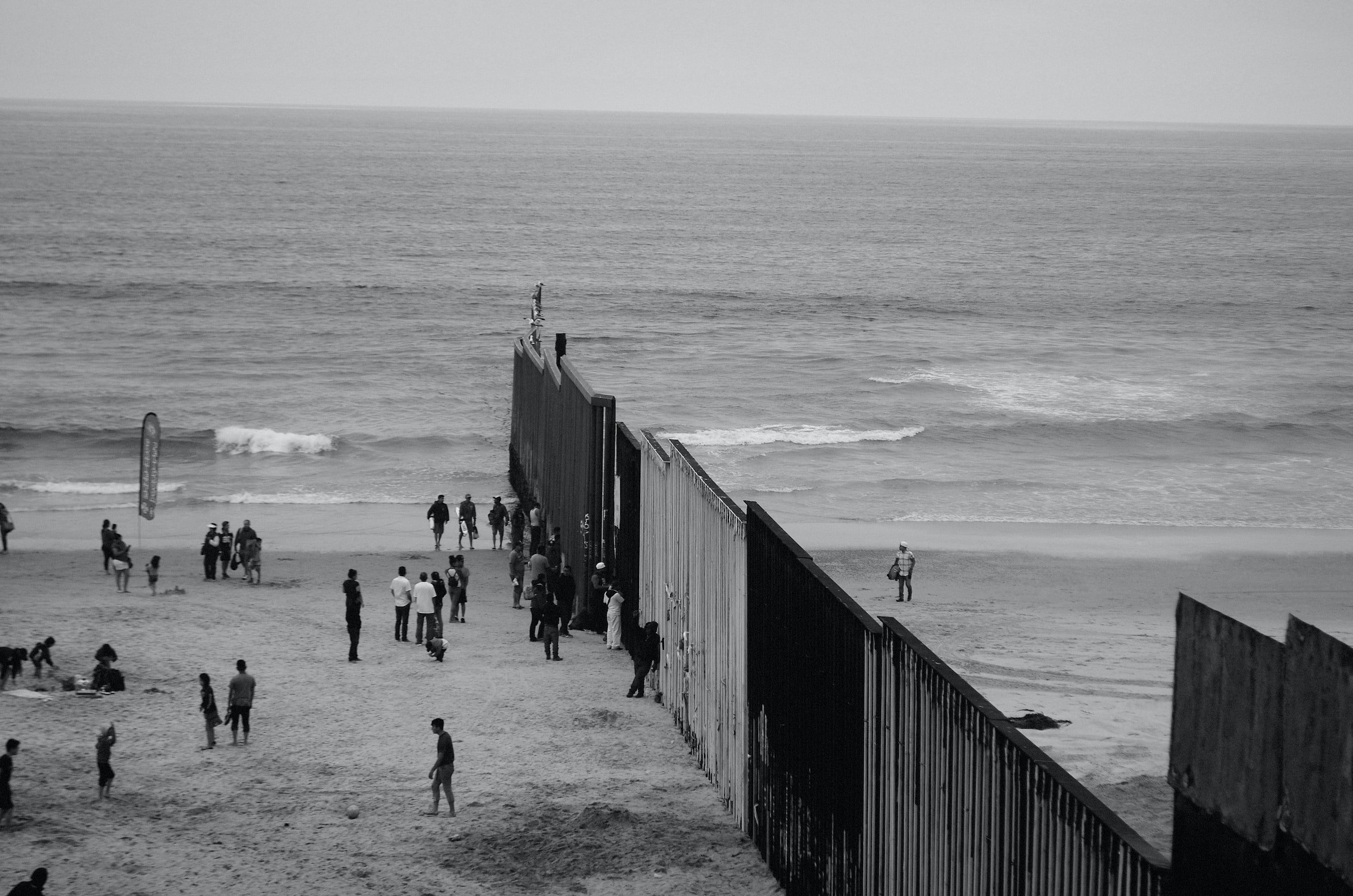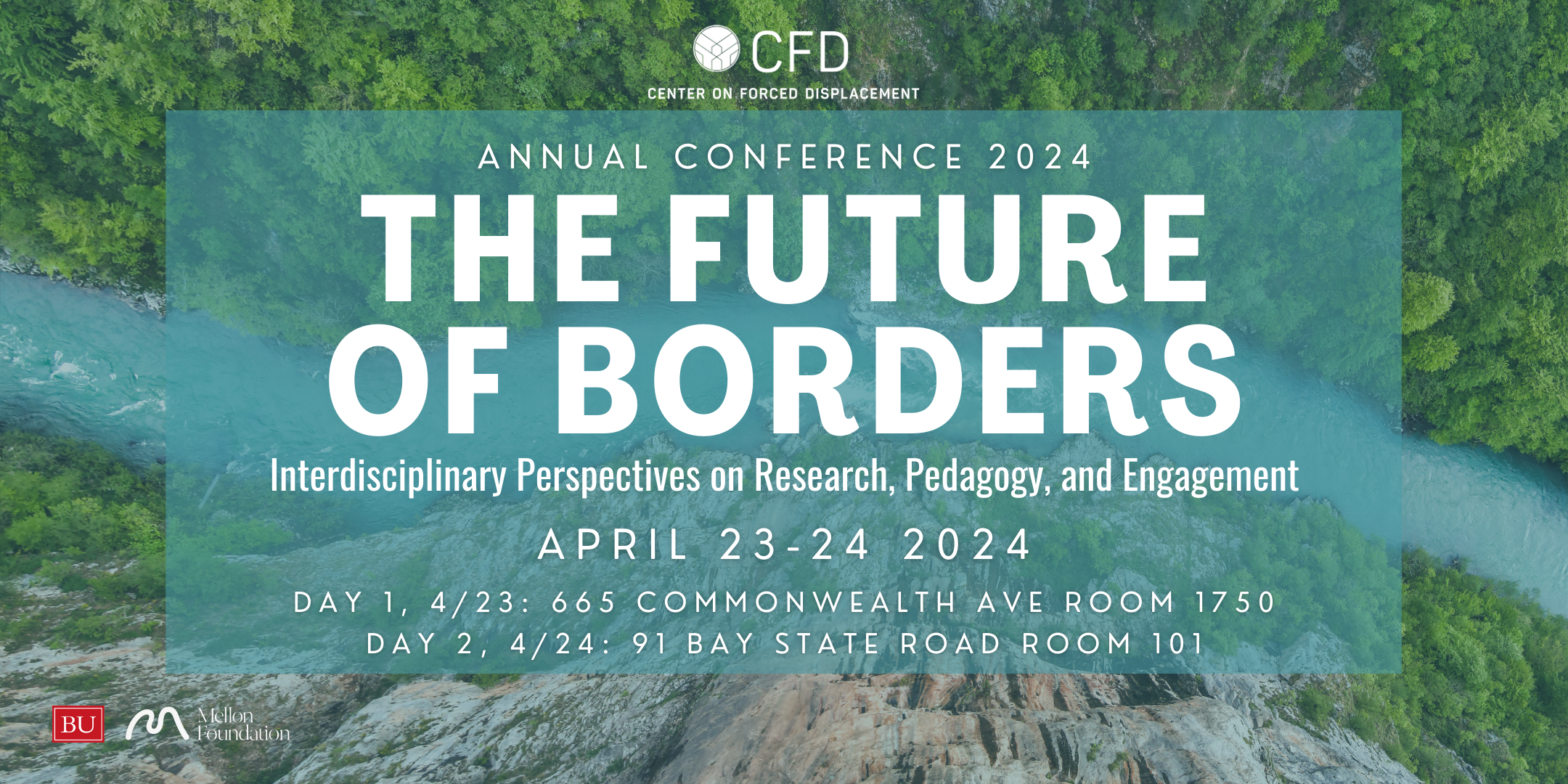
Border Externalization Regimes:
Ethics, Identities, and Impacts
THE MELLON FOUNDATION SAWYER SEMINARS
The Mellon Foundation’s Sawyer Seminars were established in 1994 to provide support for comparative research on the historical and cultural sources of contemporary developments. Named in honor of the Mellon’s long-serving third president, John E. Sawyer, the seminars have brought together faculty, foreign visitors, postdoctoral fellows, and graduate students from a variety of fields mainly, but not exclusively, in the arts, humanities, and interpretive social sciences, for intensive study of subjects chosen by the participants. Mellon support aims to engage productive scholars in comparative inquiry that would (in ordinary university circumstances) be difficult to pursue. Researchers at Boston University’s Center on Forced Displacement are proud to have received a grant from the Mellon Foundation to conduct a Sawyer Seminar series in 2023-2024 on the topic of border externalization.
Welcome to the BU Mellon Sawyer Seminars, 2023-2024
US-Mexico and EU-Balkans Border Externalization Regimes: Ethics, Identities, and Impacts
Where exactly are national borders located, policed, and imagined? Across the Mexico US border, asylum seekers, mostly from South America and the Caribbean, wait as their asylum cases are adjudicated in the US - often for years - in informal camps and settlements that are not under the jurisdiction of the United Nations High Commission for Refugees (UNHCR) or any other international UN organization, nor effectively protected by either state. This phenomenon does not persist in isolation; asylum seekers and migrants to Italy and other European states are being “pushed-back” to Western Balkan states, even abandoned at sea, as a strategy to prevent migrants from reaching European borders. Mexico and Serbia, once considered “transit countries” through which refugees and migrants pass, are increasingly being repositioned as sites of confinement and “pushback” by US and EU policies. Bilateral migration agreements, detention centers in third countries, interceptions in international waters, and mass expulsions all externalize the border and threaten international rights to seek asylum. Policies such as “Remain in Mexico” and “The Pact on Migration and Asylum,” authorize extensive deportation and detention of asylum seekers, while being publicly propositioned as protocols for migrant protection, or recently, for public health. These and other policies of border externalization are causing humanitarian disasters and have a broader global impact as they contribute to the rise of far-right extremism and bigoted nationalisms as well as racial and class-based inequities.
Our Sawyer Seminar, US-Mexico and EU-Balkans Border Externalization Regimes: Ethics, Identities, and Impacts is an interdisciplinary comparison of US and EU border externalization policies and practices. Whereas border externalization has mostly been approached from the perspectives of international relations and political science, we seek to focus on the humanistic elements of the crisis by centering ethical questions; identities, histories, and cultures; arts and narratives; technologies and health care; and models of hospitality.
We aim to foster comparative research on border externalization, considering historical, cultural, and political sources of US and EU border regimes and grappling with the great ethical question of how we receive, but also perceive and share, the suffering of the stranger, the newcomer, and the other.

PRINCIPAL INVESTIGATORS
-

Dr. Carrie Preston
Dr. Preston is a professor in the English Department and Women’s, Gender, & Sexuality Studies Program, Director of Kilachand Honors College, and Associate Director of the Center on Forced Displacement at Boston University. Her writing on gender, sexuality, race, performance, and critical displacement…
-

Dr. Muhammad Zaman
Dr. Zaman is an HHMI professor of Biomedical Engineering and Global Health and Director of the Center on Forced Displacement at Boston University. He received his master’s and P.h.D from the University of Chicago. In addition to five books and over 130 peer-reviewed research articles…
-

Marina Lazetic
Marina Lazetic is a forced displacement and extremism researcher and Director of Programs at the Center on Forced Displacement at Boston University. Throughout her academic and professional career, she has worked on projects related to forced displacement, nationalism, conflict prevention, gender, and human security.
-

Noora Lori
Noora Lori is an Associate Professor of International Relations at the Pardee School of Global Studies and an affiliate faculty at the Center on Forced Displacement at Boston University. Her research broadly focuses on citizenship, migration, and statelessness. She is interested in temporal strategies of migration enforcement and…
FELLOWS
Dr. Isabella Trombetta is a postdoctoral associate at the Center on Forced Displacement at Boston University. Her primary research focuses on migration in the Central Mediterranean and how international maritime law and humanitarian law affect border shaping in the high seas. She also worked on projects relating the EU response to border pressures, the categories of migration, and on the criminalization of NGOs. Previously she worked as communications officer with the SAR NGO SOS MEDITERRANEE both on board the boat Aquarius and at the Italian headquarters of the NGO.
Dr. Isabella Trombetta
Micah is a Ph.D. candidate in the Department of Philosophy and Sawyer Seminar Graduate Fellow at the Center on Forced Displacement at Boston University. His research focuses primarily on ethical questions about displacement and territory. His dissertation, “Refugees and a Right to Place,” draws on phenomenological insights into the normative significance of the places we inhabit — in particular the way our environment shapes various aspects of our agency and wellbeing— in order to identify and articulate a set of under-recognized harms in the contemporary response to protracted displacement.
Micah Trautmann
Catherine (Cat) is a Ph.D. candidate in Political Science and a graduate certificate recipient of the Women, Gender, and Sexuality Studies program. Her work particularly focuses on understanding experiences of people facing forced displacement and conflict through an intersectional lens of race and gender, primarily centering identity. Cat has extensively worked with forcibly displaced communities settling in the United States. She is currently the Co-Chair of the Forced Migration and Human trafficking Initiative at the Pardee School of Global Studies and the Graduate Coordinator of BU’s Citizenship Hub. As Cat soon begins as a CFD Graduate Fellow for the Sawyer Seminar series, she will continue her dissertation research on understanding how people’s identities impact their experiences in seeking asylum after being forcibly displaced.















